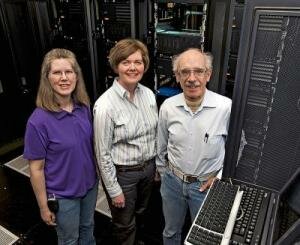The Most Powerful Supercomputer in the World
They can't wait to do computational chemistry at a quadrillion calculations per second. But it's not all that computing power that's driving three Iowa State University and Ames Laboratory researchers as they develop computational chemistry at the petascale.
Driving their project is the ability to run complex calculations and do better science.
"Petascale power is required for accuracy," said Monica Lamm, an Iowa State assistant professor of chemical and biological engineering and associate scientist at the U.S. Department of Energy's Ames Laboratory who studies complex molecular binding. "Now we have to use methods that are less accurate and less reliable."
Theresa Windus, an Iowa State professor of chemistry and an associate of the Ames Laboratory, said higher computing power will make a big difference in her studies of atmospheric particles: "This allows us to get results we've never had before."
The source of the new and improved computing power is Blue Waters, a supercomputer that's being developed as a joint effort of the University of Illinois at Urbana-Champaign, its National Center for Supercomputing Applications, IBM, and the Great Lakes Consortium for Petascale Computation, which includes Iowa State.
Blue Waters is expected to be the most powerful supercomputer in the world for open scientific research when it comes online in 2011. It will be the first system of its kind to sustain one petaflop performance - one quadrillion calculations per second - on a range of science and engineering applications.
Blue Waters is supported by the National Science Foundation and the University of Illinois.

"Iowa State University and Ames Laboratory researchers, left to right, Theresa Windus, Monica Lamm and Mark Gordon are working to scale up their computational chemistry tools for the Blue Waters supercomputer being developed at the University of Illinois and its National Center for Supercomputing Applications. (Credit: Photo by Bob Elbert/Iowa State University.)"
Source: Iowa State University
|